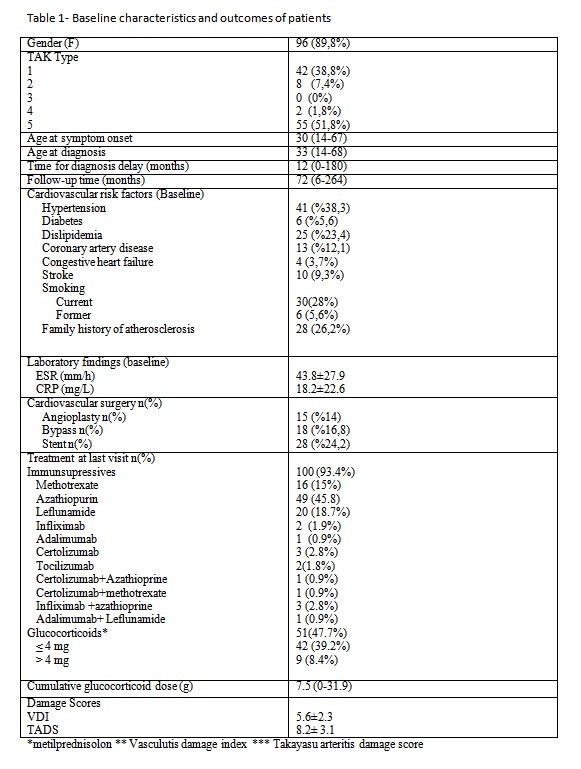Session Information
Date: Tuesday, October 23, 2018
Title: Vasculitis Poster III: Immunosuppressive Therapy in Giant Cell Arteritis and Polymyalgia Rheumatica
Session Type: ACR Poster Session C
Session Time: 9:00AM-11:00AM
Background/Purpose:
To assess the clinical characteristics and long term follow-up outcomes of patients with Takayasu’s arteritis (TAK) in a tertiary referral center.
Methods:
In this retrospective study, 107 (F/M: 96/11) patients fullfilling ACR 1990 criteria for Takayasu Arteritis and referred to our center between 2004 and 2017 were investigated. All clinical and demographic data during first diagnosis and longitudinal followup were abstracted from medical records. Relapse was defined according to the physician’s global assessment (PGA).
Results:
The median age was 30 (14-67) years at symptom onset and 33 (14-68) years at diagnosis. Median follow-up duration was 72 (6-264) months. According to Hata Angiographic Classification, Type 5 (51.8%) and Type 1 (38.8%) were the most common patterns with the most frequently affected vessel subclavian artery (82.2%) . At diagnosis 0.5-1 mg/kg/day corticosteroid treatment was started in 94.6% patients and a steroid-sparing immunsuppressive (IS) agent in 96.3% of the patients. An initial pulse steroid (1 g/day) therapy was chosen for 8 patients. Before diagnosis 24% patients had a history of a revascularization procedure. After IS treatments, 24% of the patients were undergone a new revascularization procedure. During follow-up, biologic agents were chosen for 13.8% of the patients (5 infliximab and certolizumab each, 2 adalimumab and 2 tociluzumab). Remission was observed in 84% of the patients. At least one relapse was occured in 43% and > 1 relapse in %14 patients. At the last visit 26% were determined to have an active disease. A > 4 mg of methylprednisolone dose was required in only 8.4%(Image 1) . Mortality rate was 3.7% (4 patients).
Conclusion:
We have defined the long-term follow-up results of our Takayasu’s arteritis cohort. Comparing with European and Asia series published recently, requirement for a surgical intervention was lower under immunosuppressive treatments in our series. However, disease activity and relapse rate were still high under conventional ISs, suggesting a need for better therapeutic options.
Image 1- Baseline characteristics and outcomes of patients
To cite this abstract in AMA style:
Kaymaz Tahra S, Alibaz-Oner F, Direskeneli H. Long Term Follow-up Results of Takayasu Arteritis Cohort: A Tertiary-Single Center Study [abstract]. Arthritis Rheumatol. 2018; 70 (suppl 9). https://acrabstracts.org/abstract/long-term-follow-up-results-of-takayasu-arteritis-cohort-a-tertiary-single-center-study/. Accessed .« Back to 2018 ACR/ARHP Annual Meeting
ACR Meeting Abstracts - https://acrabstracts.org/abstract/long-term-follow-up-results-of-takayasu-arteritis-cohort-a-tertiary-single-center-study/

